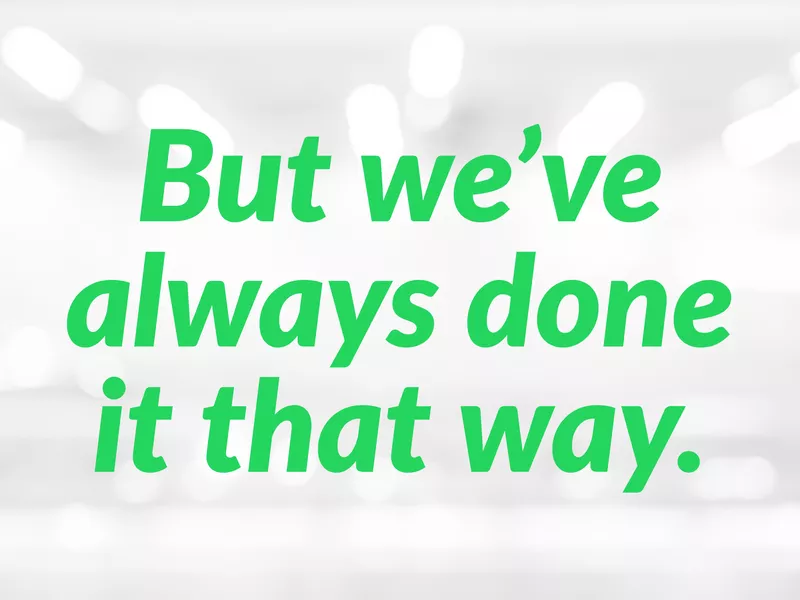Twenty-first century workplaces may look and feel more casual than ever — with their relaxed dress codes, open floor plans and fluid organizational charts — but there are still rules of how workers are expected to speak to the boss. “Social media has encouraged the loosening of boundaries. Because of the breakdown of formality, work from home and flex time, everybody’s more at ease,” said Kelly Bergeron, an executive coach with Novateur Partners in Atlanta, Georgia.
The former Marine Corps officer and chief human relations officer is a certified corporate coach through the Worldwide Association of Business Coaches (WABC) and uses her training to coach and mentor professionals to become better leaders. She’s seen employees get into difficult — and almost always avoidable — situations by not thinking before they speak. “People get lulled into informality with the boss and other people. The boundaries still exist, they’re just not as rigid or defined,” Bergeron said.
Consider this your primer on what not to say to your boss.
No. 1

Excessive informality can easily be perceived as disrespect.
“I’ve seen employees dig a hole for themselves by thinking that air of familiarity will extend to board members,” Bergeron said. “Being flippant or cavalier is still not accepted in the board room or executive suite. It’s still up to the employee to convince their boss that they can deliver [by speaking professionally].”
No. 2

Honesty is always a good policy, but if you don’t know, say so and follow up with your action plan to determine the answer. So instead of a flippant, “I don’t know,” you might say something like, “I’m not sure of the answer, but I know how to find out. Let me get that data and report back.”
The second response shows you’re resourceful and ready to get the job done.
No. 3

It’s natural to forge friendly office relationships that include occasional discussions about your life outside of the workplace. However, proceed with caution, Bergeron advised. “Bosses don’t want to hear about what you did on the weekend,” she said. “They want to know what you’re doing to contribute to the bottom line.”
A good rule of thumb? Keep the focus mostly on work and leave the juicer details out.
No. 4

Deflecting blame or “saying things like, ‘I wasn’t shown how to do that’ or ‘I can’t do that because I don’t know how’ is going to incense any boss,” Bergeron said.
Instead, take responsibility for the part you played and inquire about how to get the tools you need to successfully complete the task at hand.
No. 5

There’s an old saying about never talking about politics or religion at the dinner table, and the same applies to the workplace.
No matter how much you think your beliefs align with those around you, such divisive topics don’t belong in the office.
No. 6

“There isn’t a boss out there that likes for someone to plow into the office and ask this question,” said Bergeron.
Instead, she recommends connecting the possible pay increase into merit with positive subjects like, “I’d like to talk about my performance, how you think I’m doing, and if you can give me some feedback. And with that, when might I be able to be considered for an increase in pay.”
Such an approach can help put the boss at ease.
No. 7

Swear words can make even the smartest person sound like a dunce, no matter how casual the workplace.
Even if your colleagues regularly throw around dirty words, don’t dumb your speech down to match. In some more conservative offices, crass language could land you in the hot seat with HR.
No. 8

Criticizing other employees to your boss is a dangerous game to play. “Even though the boss might listen, it’s not respected,” Bergeron said. “The boss is thinking, ‘This person complaining about other people isn’t to be trusted.’ It almost always backfires.”
Instead, if you’re asked a question about another team member, try to answer honestly without being overly critical.
No. 9

Say this and expect alarm bells to ring off in your boss’ mind immediately. This question shows that you’re not a team player and likely can’t be trusted.
If you still hope to get an answer in a less argumentative, selfish way, you might say something like, “I’m eager to contribute. As you know, I’ve expressed an interest in developing skills A and B. Is there a way to make sure I’m getting some experience in those areas with this project?”
No. 10

The word “can’t” shouldn’t be part of your work vocabulary. If you’re asked to perform a task that you don’t know how to do, say something like, “I’m eager to learn how to complete the task, but it’s not something I’ve done before. Can you help point me toward the right person or tool so I can do a great job on this project?”
Such a question shows that you’re driven, a team player and eager for development opportunities.
No. 11

No boss wants to feel like you’re wasting the company’s dime by goofing around when you’re on the clock.
If you find yourself less than challenged, ask your boss or colleagues if you can pick up additional competency-building projects after you’ve successfully completed your work. This will help solidify your reputation as a team player and someone who wants to develop new skills.
No. 12

What you choose to do with your off-duty hours is your business (to some degree), but when you’re on the clock, your boss has every right to expect you to be in tip-top shape.
So, even if you had a few drinks too many the night before, when you walk through your office doors, you should be prepared to do your best work (or at least give it your best effort).
No. 13

Assumptions are generally dangerous and can lead to misunderstandings.
If you have questions about how things work or should work, ask them up front or at the start of a project to avoid unnecessary misunderstandings.
No. 14

Since most employers provide tools for work even when you’re not in the office — a mobile phone, laptop and some element of flexibility — the expectation can be that you’re always working. “In this age of a boundaryless work environment, the excuse ‘I didn’t have time’ can raise the hairs on the back of your boss’ neck,” Bergeron said.
If you legitimately find yourself falling behind beneath an unrealistic workload, ask a question like, “I’m having trouble completing all of my assigned tasks with the excellence I expect. Can you help me prioritize so that I can exceed your expectations on the most vital projects?”
You may be able to parlay such a question into a conversation about priorities and a balanced workload.
No. 15

It’s always unwise to threaten your boss with quitting. “Never threaten to leave. Don’t show your hand. Instead, always ask for more development and get a lot of feedback about how you can advance. Those questions are very welcomed,” Bergeron said. “If you threaten to leave, they recognize that you’re on borrowed time and will look for an exit strategy.”
That means if you threaten to leave, your boss may look for a way to speed the process, whether you like it or not.
No. 16

This flippant statement shows you lack vision and critical problem-solving skills. Some of the world’s best inventions and solutions have been thought to be impossible before a visionary made them work. Instead, say something like, “That’s interesting. How do you see that working?”
By engaging in a dialogue about the possibilities, you show you’re open-minded and your team might land on a solution no one expects.
No. 17

When it comes to getting things done on time, always keep the boss informed if there’s a chance you might not meet the deadline. “No boss or CEO wants to know that a project isn’t done when it’s due,” Bergeron said.
Instead, she recommends you “give status reports. Even if you get blasted for [running behind], information has power. If you wait until it’s due, it’s overdue. Don’t get lulled into complacency.”
No. 18

Whether directly or indirectly, your boss is paying for your time, so it’s always wise to accommodate when the boss asks for a moment. That said, there will be times in your professional experience when you’ll need to manage up, meaning subtly teaching your boss how to treat you to help you and your company achieve success.
You might say something like, “I’m happy to have a meeting. I did want to mention, though, that I’m closing in on the deadline for that big project you assigned” to keep your manager informed.
No. 19

This statement is a surefire way to identify yourself as a disgruntled employee, someone who doesn’t feel valued or a flight risk.
“As a manager, you’re not going to hold this person in high regard if it’s all about the money,” said Jill Hand, managing consultant for hrQ, a professional services firm that often functions as an extension of client companies’ HR departments. “Plus, you might wonder if they really are doing as much as they say they’re doing.”
This kind of comment can also make you sound arrogant since there are probably other employees at the same level of pay who are going above and beyond. Instead, view challenges as an opportunity to develop new skills and say something like, “I’d love to take that task on to learn and grow.”
No. 20

Beware of making statements that make you sound inflexible since most innovation happens with out-of-the-box thinking.
If your boss or a colleague suggests doing something a different way, take the opportunity to ask questions about how he or she sees the strategy working and try to make it even better.
No. 21

We get it: There are parts of every job that might feel undesirable (we’re looking at you, expense reports!).
However, keep the griping and grousing to yourself and try to conquer to-do list items with a smile. Your cheerful attitude will make you more of an asset to your team and the boss will likely take note.
No. 22

Statements like this “can cause a negative work environment,” Hand said, and no one likes to know that one of their team members feels superior.
Plus, shirking responsibility of any kind can give your bosses the impression that you’re not doing your job.
No. 23

This statement sounds threatening and the boss could view it as immature. Plus, it’s short-sighted to think you know the full spectrum of anyone else’s role. “Clearly, somebody put together the [responsibilities] of the levels within the corporation,” said Hand. “We don’t always know what other people are doing behind the scenes.”
If you’re interested in progressing and learning about your boss’s job, ask to assist with competency-building projects that add value.
No. 24

Anytime you feel the urge to express negative feelings about a customer, think twice. “A sentence like this will lessen the person’s opportunity to grow,” Hand said. “As a manager, you automatically put a red flag around someone badmouthing a customer. A boss would think that employee doesn’t have the ability to handle hard things.”
On the contrary, a savvy boss will see if a customer is truly challenging. “The employees who are able to manage a difficult relationship are going to be able to shine,” said Hand.
No. 25

The tone you use is really telling, and it’s never a good idea to sound exasperated with your manager.
“It shows disrespect,” said Hand. “A person with this attitude is not going to be on the team for very long. They’re putting a box around themselves and proving they’re not mature enough to handle the job.”
No. 26

This might sound like a compliment, but you’re taking a risk anytime you comment about a superior’s — or really, any colleague’s — physique.
It’s safer to stay on more neutral, less personal, topics in the office.
No. 27

“Getting too comfortable at work is always a risk,” Hand said.
Acting lackadaisical or apathetic about your job or the tasks at hand can cast you in a negative light with your superiors and your peers. It’s true we all have days or times when we feel our energy flagging, but while you’re on the company’s dime it’s important to muster the motivation to get the job done.
No. 28

Being truthful in the interview process should be the minimum that your company can expect, but if you do choose to bend the truth, it’s best not to highlight it once you’re hired. “This is always going to come back to you,” Hand said, adding that “the onus is on the interviewer or the HR pro to do a more behavioral interview to weed these people out.”
Just remember: You’re hired for your expertise, so you’ll be expected to do the things you said you could do during the interview.